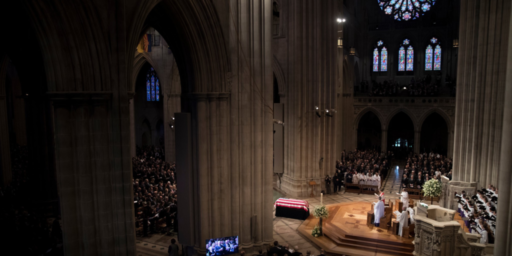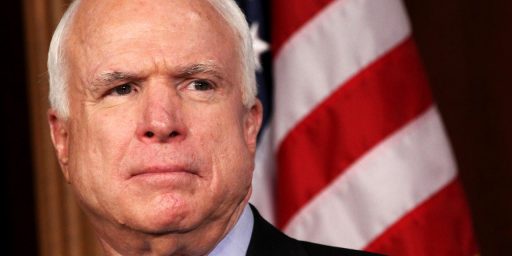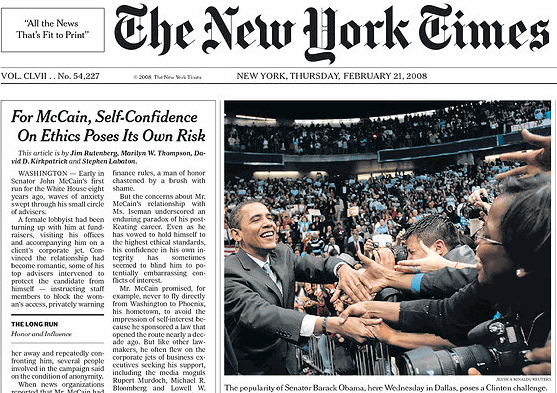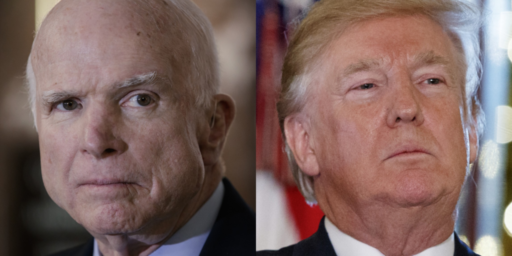Obama Has Huge Lead in Another Poll
Barack Obama has a 12-point lead in the latest Bloomberg/LAT poll, giving those of us who thought the 15-point lead in last week’s Newsweek poll was an outlier some pause.
In a two-man race between the major-party candidates, registered voters chose Obama over McCain by 49% to 37% in the national poll, conducted Thursday through Monday. On a four-man ballot that included independent candidate Ralph Nader and Libertarian Bob Barr, voters chose Obama over McCain by 48% to 33%.
Obama’s lead — bigger in this poll than in most other national surveys — appears to stem largely from his positions on domestic issues. Both Democrats and independent voters said Obama would do a better job than McCain at handling the nation’s economic problems, the public’s top concern. In contrast, many voters said McCain was the more experienced candidate and better equipped to protect the nation against terrorism — but they ranked those concerns below economic issues.
McCain suffers from a pronounced “passion gap,” especially among conservatives who usually give Republican candidates a reliable base of support. Among voters who described themselves as conservative, 58% said they would vote for McCain; 15% said they would vote for Obama, 14% said they would vote for someone else, and 13% said they were undecided. By contrast, 79% of voters who described themselves as liberal said they planned to vote for Obama.
I’m still skeptical of the numbers but find the conclusions reasonable. Indeed, I didn’t need a poll to tell me that Americans care more about domestic issues than foreign policy, especially now that the war in Iraq has moved to the back burner, or that Obama has more intensity of support than McCain.
The numbers just don’t make sense. We now have two polls showing double-digit Obama leads, while most taken during the same time period show a very modest gap:

Aside from the fact that Newsweek and LAT/Bloomberg are sampling registered voters whereas Rasmussen and USA Today/Gallup are using likely voter screens, it’s not obvious what methodological differences might account for this degree of variation. More oddly, Gallup’s registered voter tracking poll shows a closer race than their likely voter poll for USA Today, albeit within the margin of error.
The bottom line is that we don’t have a very good read right now and, as I continue to emphasize, June polls are historically poor predictors of November behavior. The RealClearPolitics average of 7.5, though, is probably as good an indicator as any on where the national race stands.
Of course, we elect presidents via the Electoral College, so what really matters is how the candidates are doing in each of the 50 states. Nate Silver has it at 343.8 to 194.2. (He’s also got an intriguing hypothesis about Obama’s strength as a Midwestern candidate that I may revisit in a later post.) Electoral-Vote.com has it at Obama 317, McCain 194 with Florida too close to call. Those numbers are the ones to watch.





Obam-ho-tep… Obam-ho-tep… Obam-ho-tep…
It’s quite simple really. Obama is just better at being a liberal than McCain is.
As another commenter somewhere said – this general election is gonna feel like voting in a democratic primary!
Wake me in October.
On one hand Obama’s support trends younger and younger americans are much more likely to be registered but not actually vote than older demographics. The counterargument though is that if the youth vote is really pumped up wouldn’t they say they were likely to vote (even if the truth is they probably won’t)?